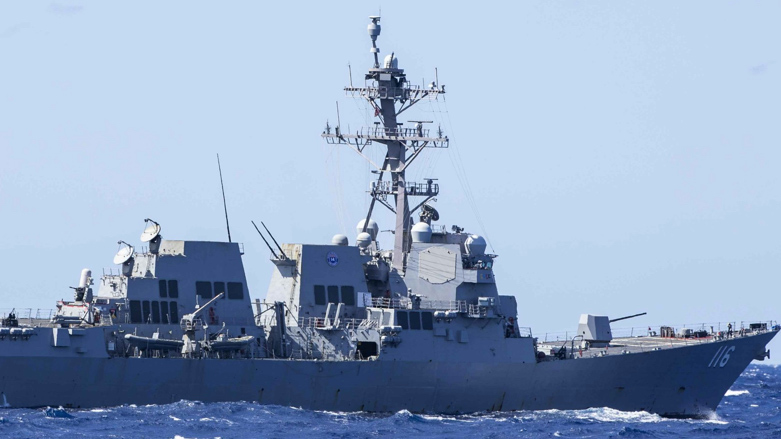U.S. Beefs Up Military Presence to Counter Iranian Ship Seizures

WASHINGTON DC, United States (Kurdistan 24) – In response to Iranian aggression directed at oil shipping around the Strait of Hormuz, the U.S. Defense Department announced on Monday that it is increasing its military presence in the region.
“In response to a number of recent alarming events in the Strait of Hormuz, the Secretary of Defense has ordered the deployment of the destroyer USS Thomas Hudner, F-35 fighters and F-16 fighters” to the region in order “to defend U.S. interests and safeguard freedom of navigation,” Sabrina Singh, the Pentagon’s Deputy Press Secretary told reporters.
On July 5, Iranian naval vessels twice tried to seize two oil tankers in international waters off the coast of Oman. Both attempts were thwarted by the arrival of a U.S. Navy guided missile destroyer, the USS McFaul.
In the second instance, which involved the Bahamian-flagged oil tanker, Richmond Voyager, “Iranian personnel fired multiple, long bursts from both small arms and crew-served weapons,” before the McFaul arrived, which prompted the Iranian ship to leave, a CENTCOM press release explained at the time.
The press release also noted that there had been—as of July 5—an “uptick in Iranian merchant vessel seizures” which, in May, had caused the US to “increase the rotation of ships and aircraft patrolling the Strait of Hormuz.”
That measure proved insufficient to deal with Iran’s more aggressive posture, however. Thus, Monday’s announcement has followed with a bigger, more sophisticated U.S. military presence, including the USS Thomas Hudner destroyer.
That move comes, as friction between the White House and Congressional Republicans on Iran policy is increasing, as The Washington Times reported on Monday.
The Times cited a statement by the Chairman of the House Foreign Affairs Committee, Michael McCaul (Republican, Texas), to CBS News suggesting that Robert Malley, who had served as the Biden administration’s top emissary for renewing the Iranian nuclear deal, had shared classified U.S. information with Iranian officials.
“That would be treason in my view,” McCaul said.
Initially, Malley was placed on paid leave, when his security clearance was suspended, pending a question about how he had handled classified information. But in late June, his status was changed to unpaid leave, suggesting that the inquiry was not going well for him.
Read More: U.S. Special Envoy for Iran Placed on Unpaid Leave
McCaul’s statement was the first time a U.S. official publicly explained just how Malley might have mishandled classified information and just what the FBI was investigating about his actions.
Asked on the same CBS program about Malley’s status, National Security Council Advisor Jake Sullivan praised him, but added, “I can't speak to the current circumstances.”
Also on Monday, State Department Spokesperson Matthew Miller was asked about Tehran’s renewed crackdown on Iranian women who are not wearing a headscarf.
Notably, perhaps, Miller’s response referred to Iran’s “so-called morality police,” underscoring the dubious status of their actions.
“We are concerned by the reports that Iran’s so-called morality police,” Miller replied, are “again cracking down to enforce mandatory hijab.”
“It seems the regime has learned nothing from the recent protests,” he continued. “And we believe that women and girls everywhere should be allowed to wear what they want.”
